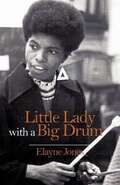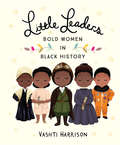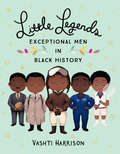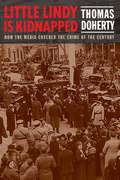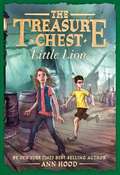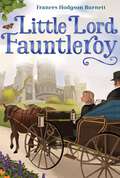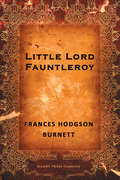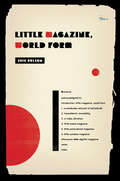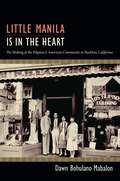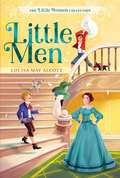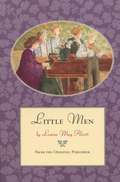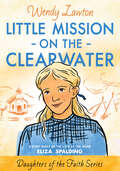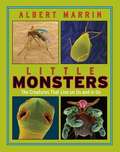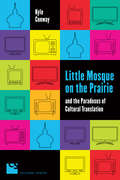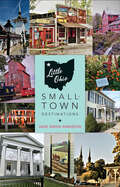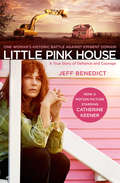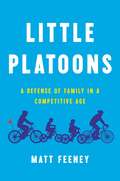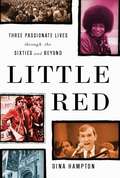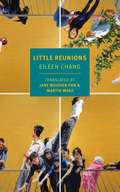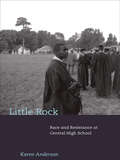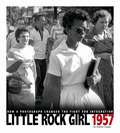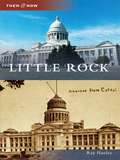- Table View
- List View
Little Lady With a Big Drum
by Elayne JonesThis, the official autobiography of Elayne Jones, is the story of one woman's remarkable life and career in her own words; a journey from meager beginnings as a self-described "skinny little girl from Harlem," to the highest echelons of classical music. With a musical talent and personal drive that enabled her to transcend racial and gender barriers, Jones became the first African American woman in the New York Philharmonic Symphony Orchestra. A world renown tympanist, Elayne Jones is a graduate of the Arts and Music High School in New York. She then attended Juilliard, being among the first winners of the Ellington Juilliard Scholarship. Jones' professional career began in 1949 with the New York City Opera. Over the course of five decades, Elayne Jones played with the American Ballet Theatre, Arthur Fiedler and the World Symphony Orchestra, Leopold Stokowski and the American Symphony Orchestra, Seiji Ozawa and the San Francisco Symphony, and the San Francisco Opera. In 1965 she won the LaGuardia Memorial Award in recognition of her outstanding achievements in music. She has presented over 375 solo lecture demonstrations nationally and internationally of percussion instruments in schools and colleges, and in 1975, National Educational Television produced and aired a TV special on PBS featuring Jones entitled, "A Day in the Life of a Musician." Countless performances by Jones include television, recordings, musicals, and ballets. Elayne Jones is universally recognized as one of the most prominent African Americans of the 20th Century. Alongside music, Jones was also an accomplished amateur tennis player for some 43 years, until an injury forced her to give up the game. Some of the high points in playing included tennis matches with tenor Luciano Pavarotti and conductor Seiji Ozawa. Jones retired from her career in music in 1998. A mother of three, she currently resides in the San Francisco East Bay Area, in Walnut Creek, California.
Little Leaders: Bold Women in Black History (Vashti Harrison)
by Vashti Harrison<P>This beautifully illustrated book introduces reader of all ages to 40 women who changed the world. <P>Featuring forty trailblazing black women in American history, Little Leaders educates and inspires as it relates true stories of breaking boundaries and achieving beyond expectations. Illuminating text paired with irresistible illustrations bring to life both iconic and lesser-known female figures of Black history such as abolitionist Sojourner Truth, pilot Bessie Coleman, chemist Alice Ball, politician Shirley Chisholm, mathematician Katherine Johnson, poet Maya Angelou, and filmmaker Julie Dash. <P>Among these biographies, readers will find heroes, role models, and everyday women who did extraordinary things - bold women whose actions and beliefs contributed to making the world better for generations of girls and women to come. Whether they were putting pen to paper, soaring through the air or speaking up for the rights of others, the women profiled in these pages were all taking a stand against a world that didn't always accept them. <P> The leaders in this book may be little, but they all did something big and amazing, inspiring generations to come. <P><b>A New York Times Bestseller</b>
Little Legends: Exceptional Men In Black History
by Vashti HarrisonNew York Times bestselling author-illustrator Vashti Harrison shines a bold, joyous light on black men through history.An important book for readers of all ages, this beautifully illustrated and engagingly written volume brings to life true stories of black men in history. Among these biographies, readers will find aviators and artists, politicians and pop stars, athletes and activists. The exceptional men featured include artist Aaron Douglas, civil rights leader John Lewis, dancer Alvin Ailey, filmmaker Oscar Micheaux, musician Prince, photographer Gordon Parks, tennis champion Arthur Ashe, and writer James Baldwin.The legends in this book span centuries and continents, but what they have in common is that each one has blazed a trail for generations to come.
Little Lindy Is Kidnapped: How the Media Covered the Crime of the Century
by Thomas DohertyThe biggest crime story in American history began on the night of March 1, 1932, when the twenty-month-old son of Charles and Anne Lindbergh was snatched from his crib in Hopewell, New Jersey. The news shocked a nation enthralled with the aviator, the first person to fly solo nonstop across the Atlantic. American law enforcement marshalled all its resources to return “Little Lindy” to the arms of his parents—and perhaps even more energized were the legions of journalists catering to a public whose appetite for Lindbergh news was insatiable.In Little Lindy Is Kidnapped, Thomas Doherty offers a lively and comprehensive cultural history of the media coverage of the abduction and its aftermath. Beginning with Lindbergh’s ascent to fame and proceeding through the trial and execution of the accused kidnapper, Doherty traces how newspapers, radio, and newsreels reported on what was dubbed the “crime of the century.” He casts the affair as a transformative moment for American journalism, analyzing how the case presented new challenges and opportunities for each branch of the media in the days before the rise of television. Coverage of the Lindbergh story, Doherty reveals, set the template for the way the media would treat breaking news ever after. An engrossing account of an endlessly fascinating case, Little Lindy Is Kidnapped sheds new light on an enduring quality of journalism ever since: the media’s eye on a crucial part of the story—itself.
Little Lion
by Ann HoodNow that the twins have begun to settle into their new lives at Elm Medona, they delve deeper into The Treasure Chest and uncover more about the Pickworth family, including the disappearance of their great-uncle Thorne and the theft of priceless family artifacts. In this adventure, The Treasure Chest transports Felix and Maisie to tropical St. Croix in 1772. There they meet a young man named Alexander Hamilton who is about to embark on a journey to New York. Felix and Maisie aren't sure why The Treasure Chest has brought them to meet Alexander, but they are determined to not let him out of their sights . . . even if that means stowing away on the very ship he is sailing off on! .
Little Lions, Bull Baiters & Hunting Hounds: A History of Dog Breeds
by Jeff Crosby Shelley Ann JacksonSince prehistoric times, humans and dogs have shared a unique bond and both have served each other well. Early people discarded food and as a result, wild wolves cast fear and caution aside, following and approaching their two-legged neighbors until they became less wary of each other. As humans hunted, fished, herded, and hauled, they found ways to benefit from the presence and talents of these animals. Over time, both learned to work together, rely on, and like each other.This book is a fascinating look at the distinct groups that have developed — hunting, herding, working, and companion — as humans selectively bred dogs to bring out desired attributes. Stunning illustrations, maps, and fascinating information combine to explain the origins and characteristics of typical breeds within each grouping.Little Lions, Bull Baiters & Hunting Hounds is an indispensable book for any dog lover and a wonderful guide for those about to choose their own canine companion.
Little Lord Fauntleroy (Aladdin Classics)
by Frances Hodgson Burnett Polly HorvathAt the age of sixteen Frances Hodgson Burnett moved to Tennessee with her bankrupt family and began writing for American magazines as means to support herself. Over two decades later Burnett published Little Lord Fauntleroy, modeling the character after her son Vivian. Burnett's text and Reginald Birch's original illustrations helped popularize a very romantic style of dress for boys -- a velvet suit with a broad lace collar -- in the late nineteenth and early twentieth centuries.
Little Lord Fauntleroy (Junior Classics Ser.)
by Frances Hodgson BurnettWhen Cedric Errol, a young, impoverished American boy, loses his father it seems that he and his mother are in a dire situation, until a lawyer representing wealthy English Lord pays a visit offering a new life. It turns out that Cedric is Lord Fauntleroy, heir to a vast estate in England. The Earl of Dorincourt, Cedric's grandfather, intends to mold to precocious and kind Cedric in to a proper English aristocrat but the dour old Englishman soon finds himself learning about compassion from his ward. Having to deal with a pretender to his title and the Earl's disdain for his American mother, Cedric must also adapt to his new life and learn to become Lord Fauntleroy. Hugely popular in it's day, Little Lord Fauntleroy sparked a fashion trend for the suits worn by Cedric and has been called the "Harry Potter of its time".
Little Magazine, World Form (Modernist Latitudes)
by Eric Jon BulsonLittle magazines made modernism. These unconventional, noncommercial publications may have brought writers such as James Joyce, T. S. Eliot, Ezra Pound, Marianne Moore, Mina Loy, and Wallace Stevens to the world but, as Eric Bulson shows in Little Magazine, World Form, their reach and importance extended far beyond Europe and the United States. By investigating the global and transnational itineraries of the little-magazine form, Bulson uncovers a worldwide network that influenced the development of literature and criticism in Africa, the West Indies, the Pacific Rim, and South America.In addition to identifying how these circulations and exchanges worked, Bulson also addresses equally formative moments of disconnection and immobility. British and American writers who fled to Europe to escape Anglo-American provincialism, refugees from fascism, wandering surrealists, and displaced communists all contributed to the proliferation of print. Yet the little magazine was equally crucial to literary production and consumption in the postcolonial world, where it helped connect newly independent African nations. Bulson concludes with reflections on the digitization of these defunct little magazines and what it means for our ongoing desire to understand modernism's global dimensions in the past and its digital afterlife.
Little Manila Is in the Heart: The Making of the Filipina/o American Community in Stockton, California
by Mabalon Dawn BohulanoIn the early twentieth century--not long after 1898, when the United States claimed the Philippines as an American colony--Filipinas/os became a vital part of the agricultural economy of California's fertile San Joaquin Delta. In downtown Stockton, they created Little Manila, a vibrant community of hotels, pool halls, dance halls, restaurants, grocery stores, churches, union halls, and barbershops. Little Manila was home to the largest community of Filipinas/os outside of the Philippines until the neighborhood was decimated by urban redevelopment in the 1960s. Narrating a history spanning much of the twentieth century, Dawn Bohulano Mabalon traces the growth of Stockton's Filipina/o American community, the birth and eventual destruction of Little Manila, and recent efforts to remember and preserve it. Mabalon draws on oral histories, newspapers, photographs, personal archives, and her own family's history in Stockton. She reveals how Filipina/o immigrants created a community and ethnic culture shaped by their identities as colonial subjects of the United States, their racialization in Stockton as brown people, and their collective experiences in the fields and in the Little Manila neighborhood. In the process, Mabalon places Filipinas/os at the center of the development of California agriculture and the urban West.
Little Men: Life At Plumfield With Jo's Boys - Primary Source Edition (The Little Women Collection #3)
by Louisa May AlcottLook out for Little Women—soon to be a major motion picture starring Saoirse Ronan, Emma Watson, Timothée Chalamet, and Meryl Streep! Louisa May Alcott&’s enchanting tale of Jo March continues with this beautiful collector&’s edition of Little Men, the third novel in the Little Women Collection!Following the sequel Good Wives, the third book of the series picks up where the story left off, as the now-married Jo has opened a school for boys in her late aunt&’s estate of Plumfield—one where pillow fights are allowed and the boys are encouraged to be themselves. But when orphaned street musician Nat Blake arrives and the boys&’ mischief-making gets out of control, Jo and her family&’s lives are turned upside down. Funny and heartwarming, this third installment of the Little Women series furthers the story of the March sisters while introducing new and just as captivating characters. Little Men quickly became popular at the time of publication and has become a beloved classic, inspiring numerous TV and film adaptations.
Little Men: Life at Plumfield with Jo's Boys
by Louisa May AlcottThe characters from Little Women grow up and begin new adventures at Plumfield, a progressive school founded by Jo and her husband, Professor Baer.
Little Mission on the Clearwater: A Story Based on the Life of Young Eliza Spalding (Daughters of the Faith Series)
by Wendy G. LawtonDaughters of the Faith: Ordinary Girls Who Lived Extraordinary Lives.In 1847, ten-year-old Eliza Spalding is growing up with her missionary family as the first white girl to be born in the Oregon Territory. Eliza loves seeing the Nez Perce Indians come to know Jesus, and she prays the Cayuse tribe will believe as well. But when an epidemic ravishes the Cayuse and tensions rise, Eliza finds herself witnessing the historical episode known as the Whitman Massacre. Told with rich detail and cultural appreciation for Native Americans, this adventure story will thrill young readers and encourage them in their faith.
Little Mission on the Clearwater: A Story Based on the Life of Young Eliza Spalding (Daughters of the Faith Series)
by Wendy G. LawtonDaughters of the Faith: Ordinary Girls Who Lived Extraordinary Lives.In 1847, ten-year-old Eliza Spalding is growing up with her missionary family as the first white girl to be born in the Oregon Territory. Eliza loves seeing the Nez Perce Indians come to know Jesus, and she prays the Cayuse tribe will believe as well. But when an epidemic ravishes the Cayuse and tensions rise, Eliza finds herself witnessing the historical episode known as the Whitman Massacre. Told with rich detail and cultural appreciation for Native Americans, this adventure story will thrill young readers and encourage them in their faith.
Little Monsters: The Creatures that Live on Us and in Us
by Albert MarrinAward winner Albert Marrin answers the question: "What's eating you?" - literallyFrom nonfiction master Albert Marrin, here is the shocking story of the longest running war of all time: man versus parasite. From fleas, ticks, lice, and bedbugs to worms, mites, leeches, and maggots, Marrin explains what parasites are, how they invade our bodies, and their effects for good or ill. At their best, parasites have saved limbs and lives; at their worst, they've been responsible for the deaths of billions of people and altered the course of human history. With photographs and illustrations throughout, this exploration of the hidden world exposes the creatures responsible for making our skin crawl - since the beginning of time.
Little Mosque on the Prairie and the Paradoxes of Cultural Translation
by Kyle ConwayIn 2007, Little Mosque on the Prairie premiered on the Canadian Broadcasting Corporation network. It told the story of a mosque community that worshiped in the basement of an Anglican church. It was a bona fide hit, running for six seasons and playing on networks all over the world. Kyle Conway’s textual analysis and in-depth research, including interviews from the show’s creator, executive producers, writers, and CBC executives, reveals the many ways Muslims have and have not been integrated into North American television. Despite a desire to showcase the diversity of Muslims in Canada, the makers of Little Mosque had to erase visible signs of difference in order to reach a broad audience. This paradox of ‘saleable diversity’ challenges conventional ideas about the ways in which sitcoms integrate minorities into the mainstream.
Little Ohio: Small-Town Destinations
by Jane Simon AmmesonWhere can you travel the Erie Canal on a boat pulled by a horse? What is Wapakoneta, and what does it have to do with Neil Armstrong? Where can you eat ice cream at a stop on the Underground Railroad? Find these answers and more in Little Ohio: Small-Town Destinations. Author and blogger Jane Simon Ammeson traveled across the state to discover where to eat, stay, play, and shop in more than 90 charming small towns. Organized by region, Little Ohio offers fellow road trippers an easy-to-use guide of must-see attractions. Full-color images showcase unmissable museums, quaint Main Streets, historic sites, and more.From wineries to chocolate shops, old mills to Amish villages, riverboats to covered bridges, Little Ohio has everything you need for a day, weekend, or week full of fun. No matter where you are in the Buckeye State, there's always something to explore!
Little Pink House: A True Story of Defiance and Courage
by Jeff BenedictSuzette Kelo was just trying to rebuild her life when she purchased a falling down Victorian house perched on the waterfront in New London, CT. The house wasn't particularly fancy, but with lots of hard work Suzette was able to turn it into a home that was important to her, a home that represented her new found independence. Little did she know that the City of New London, desperate to revive its flailing economy, wanted to raze her house and the others like it that sat along the waterfront in order to win a lucrative Pfizer pharmaceutical contract that would bring new business into the city. Kelo and fourteen neighbors flat out refused to sell, so the city decided to exercise its power of eminent domain to condemn their homes, launching one of the most extraordinary legal cases of our time, a case that ultimately reached the United States Supreme Court. In Little Pink House, award-winning investigative journalist Jeff Benedict takes us behind the scenes of this case -- indeed, Suzette Kelo speaks for the first time about all the details of this inspirational true story as one woman led the charge to take on corporate America to save her home.
Little Platoons: A Defense of Family in a Competitive Age
by Matt FeeneyThis eye-opening book brilliantly explores the true roots of over-parenting, and makes a case for the vital importance of family life.Parents naturally worry about the future. They want to prepare their children to compete in an uncertain world. But often, argues political philosopher and father of three Matt Feeney, today's worried parents surrender their family's autonomy to gain a leg up in this competition.In the American ideal, family life is a sacred and private sphere, distinct from the outside world. But in our hypercompetitive times, Feeney shows, parents have become increasingly willing to let the inner life of the family be colonized by outside forces that promise better futures for their kids: prestigious preschools, "educational" technologies, youth sports leagues, a multitude of enrichment activities, and -- most of all -- college. A provocative, eye-opening book for any parent who suspects their kids' stuffed schedules are not serving their best interests, Little Platoons calls us to rediscover the distinctive, profound solidarity of family life.
Little Red Lies
by Julie JohnstonThe war is over, but for thirteen-year-old Rachel, the battle has just begun. Putting childhood behind her, she knows what she wants - to prove she has acting talent worthy of the school drama club, and what she doesn't want - to romantically fall for someone completely inappropriate. Worries about her veteran brother's failing health and repugnance at her mother's unexpected and unwanted pregnancy drive her to seek solace from a seemingly sympathetic, but self-serving teacher. The lies she tells herself hoping to reach solutions to the problems complicating her life merely function to make matters worse. Ultimately, she finds a way to come to terms with life as it reaches an end and life as it begins.From the Hardcover edition.
Little Red: Three Passionate Lives through the Sixties and Beyond
by Dina HamptonIn the early 1960s, a remarkable crop of students graduated from a small New York City school renowned for progressive pedagogy and left-wing politics: Little Red School House and Elisabeth Irwin High School. These young people entered college at the peak of the transformative era we now call The Sixties, and would go on to impact the course of United States history for the next half century. Among them were Angela Davis, the brilliant, stunning African American Communist and academic who became the face of the Black Power movement; Tom Hurwitz, Students for a Democratic Society (SDS) activist and cinematographer who played a key role in the occupation of Columbia University; and Elliott Abrams, who rebelled against the leftist political orthodoxies of the school and of the times, and ultimately played key roles in the Reagan administration, the George W. Bush administrations and the neoconservative movement.In Little Red, based on extensive original interviews and archival research, Dina Hampton tells the compelling, interwoven life stories of these three schoolmates. Their tumultuous, divergent, public and private paths wind through the seminal events and political conflicts of recent American history, from the civil rights movement to the Vietnam War; the Summer of Love to the feminist uprising; Iran-Contra to Occupy Wall Street. As they pursue political ends, each of their lives will be shaped by events, relationships and social changes they never imagined. Their successes and setbacks will resonate with anyone who has struggled to reconcile the utopian goals of The Sixties-or of youth itself-with the realities of day-to-day life in the world as it is. Today, a new generation is taking to the streets, galvanized by controversial wars and social and economic inequities as troubling as those we faced in the 1960s. The stories of Angela, Tom and Elliott serve as both road map and cautionary tale for anyone engaged in that most American of acts-trying to perfect the world.
Little Reunions
by Eileen Chang Martin Merz Jane Weizhen PanA best-selling, autobiographical depiction of class privilege, bad romance, and political intrigue during World War II in China.Now available in English for the first time, Eileen Chang’s dark romance opens with Julie, living at a convent school in Hong Kong on the eve of the Japanese invasion. Her mother, Rachel, long divorced from Julie’s opium-addict father, saunters around the world with various lovers. Recollections of Julie’s horrifying but privileged childhood in Shanghai clash with a flamboyant, sometimes incestuous cast of relations that crowd her life. Eventually, back in Shanghai, she meets the magnetic Chih-yung, a traitor who collaborates with the Japanese puppet regime. Soon they’re in the throes of an impassioned love affair that swings back and forth between ardor and anxiety, secrecy and ruin. Like Julie’s relationship with her mother, her marriage to Chih-yung is marked by long stretches of separation interspersed with unexpected little reunions. Chang’s emotionally fraught, bitterly humorous novel holds a fractured mirror directly in front of her own heart.
Little Rock
by Karen AndersonThe desegregation crisis in Little Rock is a landmark of American history: on September 4, 1957, after the Supreme Court struck down racial segregation in public schools, Arkansas Governor Orval Faubus called up the National Guard to surround Little Rock Central High School, preventing black students from going in. On September 25, 1957, nine black students, escorted by federal troops, gained entrance. With grace and depth, Little Rock provides fresh perspectives on the individuals, especially the activists and policymakers, involved in these dramatic events. Looking at a wide variety of evidence and sources, Karen Anderson examines American racial politics in relation to changes in youth culture, sexuality, gender relations, and economics, and she locates the conflicts of Little Rock within the larger political and historical context. Anderson considers how white groups at the time, including middle class women and the working class, shaped American race and class relations. She documents white women's political mobilizations and, exploring political resentments, sexual fears, and religious affiliations, illuminates the reasons behind segregationists' missteps and blunders. Anderson explains how the business elite in Little Rock retained power in the face of opposition, and identifies the moral failures of business leaders and moderates who sought the appearance of federal compliance rather than actual racial justice, leaving behind a legacy of white flight, poor urban schools, and institutional racism. Probing the conflicts of school desegregation in the mid-century South, Little Rock casts new light on connections between social inequality and the culture wars of modern America.
Little Rock Girl 1957: How A Photograph Changed The Fight For Integration
by Shelley TougasNine African American students made history when they defied a governor and integrated an Arkansas high school in 1957. It was the photo of a young girl trying to enter the school being taunted, harassed and threatened by an angry mob that grabbed the world's attention and kept its disapproving gaze on Little Rock, Arkansas. In defiance of a federal court order, Governor Orval Faubus called in the National Guard to prevent the students from entering all white Central High School. The plan had been for the students to meet and go to school as a group on September 4, 1957. But one student didn't hear of the plan and tried to enter the school alone. A chilling photo by newspaper photographer Will Counts captured the sneering expression of a girl in the mob and made history. Years later Counts snapped another photo, this one of the same two girls, now grownup, reconciling in front of Central High School.
Little Rock: A Postcard History (Then and Now)
by Ray HanleyLittle Rock is small by capital-city standards, but much like larger capitals, it has been quick to demolish the old in favor of the new. There are still striking structures tucked away here and there, and to appreciate how Little Rock has evolved from sleepy, steamboat days to a booming tourist destination, Arcadia Publishing presents photographs from past and present.
